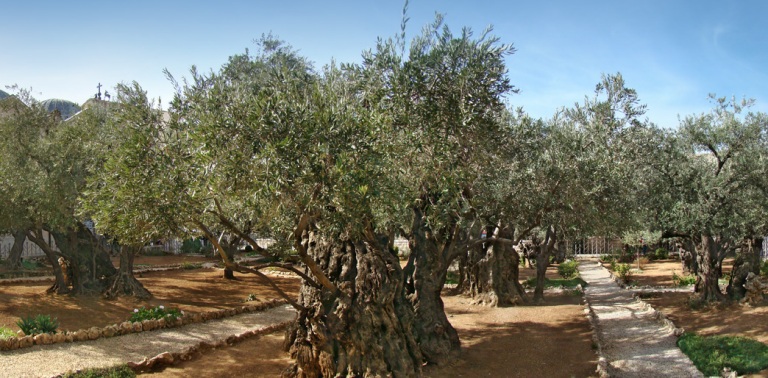The views expressed in our content reflect individual perspectives and do not represent the authoritative views of the Baha'i Faith.
 [Editor’s Note: This is the sixth installment of a multi-part essay called “Questions from a Clergyman”. Click here to read from the beginning.]
[Editor’s Note: This is the sixth installment of a multi-part essay called “Questions from a Clergyman”. Click here to read from the beginning.]
“If the agent of our salvation is not the blood of Christ, what is it?”
A home town pastor asked that question during a series of “Cult Nights” he held focused on the Bahá’í Faith. It was probably the most central question that I faced in my own spiritual journey, and one that puts me in complete empathy with my evangelical friends.
To answer, I returned to Peter’s first epistle to the “elect pilgrims” which I cited in the last post:
Since you have purified your souls in obeying the truth through the Spirit in sincere love of the brethren, love one another fervently with a pure heart … Now this is the word which by the gospel was preached to you. – 1 Peter 1: 22-25.
Here, Peter stresses obedience to the Word. This is a simple truth. Christ Himself states this most explicitly in John 15: 3-17:
You are already clean because of the word which I have spoken to you. Abide in Me, and I in you. As the branch cannot bear fruit of itself, unless it abides in the vine, neither can you, unless you abide in Me.
…If anyone does not abide in Me, he is cast out as a branch and is withered; and they gather them and throw them into the fire, and they are burned. If you abide in Me, and My words abide in you, you will ask what you desire, and it shall be done for you. By this My Father is glorified, that you bear much fruit; so you will be My disciples.
As the Father loved Me, I also have loved you; abide in My love. If you keep My commandments, you will abide in My love, just as I have kept My Father’s commandments and abide in His love.
…This is My commandment, that you love one another as I have loved you. Greater love has no one than this, than to lay down one’s life for his friends. You are My friends if you do whatever I command you. …These things I command you, that you love one another.
One of the first things Christ Jesus affirms in this passage is that: “You are already clean because of the word which I have spoken to you.” What is especially significant about this passage is the context: He is in Gethsemane, preparing His disciples for His arrest. He does not speak to them of His sacrifice, His resurrection, or His blood. He doesn’t mention atonement. He doesn’t remind them about baptism or mention the Trinity. Instead, Christ simply lays out clearly and unambiguously what they must do to be His “friends”, to stay connected to Him, to abide in God’s love, and to bear fruit.

Gethseman garden where according to the gospels, Jesus and his disciples are said to have prayed the night before Jesus’ crucifixion
Christ then singles out one commandment that will assure a connection to the True Vine: “that you love one another as I have loved you.” For emphasis, He states it twice in the same short passage. Adding: “You are My friends if you do whatever I command you.”
He singles out no other commandment in this way.
The Apostle Paul faithfully returns to this theme in his first letter to the Corinthians:
Though I speak with the tongues of men and of angels, but have not love, I have become sounding brass or a clanging cymbal. And though I have the gift of prophecy, and understand all mysteries and all knowledge, and though I have all faith, so that I could remove mountains, but have not love, I am nothing. And though I bestow all my goods to feed the poor, and though I give my body to be burned, but have not love, it profits me nothing. – 1 Corinthians 13:1-3.
“If,” Christ says. In other words, these blessings are conditional. If they would stay connected to the True Vine, they must abide in His love. If they are to abide in His love, they must keep His commandments. There is nothing about doctrinal correctness — only love, without which we are cut off, as a dead branch, and no longer receive sustenance from the Vine.
Baha’u’llah writes about this same connection:
Love Me that I may love thee. If thou lovest Me not, My love can in no wise reach thee. – Hidden Words, p. 2.
In Gethsemane, Christ clearly speaks of love for our fellow man not as a result of being connected to Him, but as a condition for maintaining a connection. This simple, elegant statement perfectly describes the eternal covenant between God and humanity. God offers spiritual life, asking in return only our love and obedience. Baha’is see this as the heart of the Gospel, and the true heart of the everlasting Faith of God.
Read the next article in the series: Saved or Unsaved – How to Know
Read the previous article in the series: Sacrifice and Resurrection
You May Also Like
Comments

















“But the goat on which the lot fell to be the scapegoat shall be presented alive before the Lord, to make atonement upon it, and to let it go as the scapegoat into the wilderness.” Leviticus 16:10
On the Day of Atonement the High Priest would confess the sins of the Israelites to Yahweh and place them figuratively on the head of a goat that took them into the wilderness never to be seen again. Thus the sins of the Israelites were "atoned for" because God’s punishment was transferred to the goat and God's justice was satisfied.
The irony is that Jesus Christ made several attempts to while on Earth to rid God's religion of the “scapegoat” paradigm without apparent success because after His death the “scapegoat” paradigm was projected onto Christ Himself even though it was not part of the Gospel that He preached. Let’s look at some examples:
“THE SON OF MAN HATH POWER UPON EARTH TO FORGIVE SINS”
In the Book of Luke it is recorded, “And when he saw their faith, he said unto him, Man, thy sins are forgiven thee. And the scribes and the Pharisees began to reason, saying, Who is this which speaketh blasphemies? Who can forgive sins, but God alone? But when Jesus perceived their thoughts, he answering said unto them, What reason ye in your hearts? Whether is easier, to say, Thy sins be forgiven thee; or to say, Rise up and walk? But that ye may know that the Son of man hath power upon earth to forgive sins.” (Luke 5:20-24)
In this passage from the Gospel, we can see that Christ forgave people their sins simply because He had the power, as God’s representative on earth, to do so. It is interesting to note that He didn’t say “your sins will be forgiven after I die for you on the
cross.” The forgiveness was immediate, in the moment—”thy sins are forgiven thee”—because one of God’s attributes is that He is the “Ever Forgiving”. To assert that God needs some sort of mechanism, “agent” or ritual in order to forgive people their sins is to place a limit on God.
“FORGIVE US OUR DEBTS, AS WE FORGIVE OUR DEBTORS.”
So, we see that Jesus practiced forgiving people their sins prior to His death, but what did He actually teach on the subject of forgiveness of sin. First, let’s examine this line from the Lord’s Prayer, “And forgive us our debts, as we forgive our debtors.” (Matthew 6:12)
Immediately after revealing the Lord’s Prayer Christ, Himself, interpreted this passage so that there would be no confusion about what it meant. He said, “For if ye forgive men their trespasses, your heavenly Father will also forgive you: But if ye forgive not men their trespasses, neither will your Father forgive your trespasses.” (Matthew 6:14-15) Jesus, in this verse, voiced the spiritual principle that God forgives us to the degree that we forgive others. Since this verse contains the word “if” it would seem to contradict the idea that God’s forgiveness is unconditional, as some have asserted. (See “Antinomianism”, i.e., anti, against, and nomos, law, which is a doctrine that states “as good works do not promote salvation, so neither do evil works hinder it; and, as all Christians are necessarily sanctified by their very vocation and profession, so as justified Christians, they are incapable of losing their spiritual holiness, justification, and final salvation by any act of disobedience to, or even by any direct violation of the law of God.” Catholic Encyclopedia,
"Antinomianism")
The Lord's Prayer was part of Jesus Christ’s famous “Sermon on the Mount.” Earlier in that same sermon Jesus stated this same spiritual principle but in a different way. It is part of what became known as the Beatitudes, “Blessed are the merciful: for they shall obtain mercy.” (Matthew 5:7) So important is this principle that God treats us we treat others, He later in the same sermon said, “Judge not, that ye be not judged. For with what judgment ye judge, ye shall be judged; and with what measure ye mete, it shall be measured to you again.” Matthew 7:1
THE PARABLE OF THE DEBTOR
One of Christ’s preferred methods of teaching people about the Kingdom of God was the parable. He used the following
parable to reiterate God’s approach to forgiveness of sin.
“Therefore is the kingdom of heaven likened unto a certain king, which would take account of his servants. And when he had begun to reckon, one was brought unto him, which owed him ten thousand talents. But forasmuch as he had not to pay, his lord commanded him to be sold, and his wife, and children, and all that he had, and payment to be made. The servant therefore fell down, and worshipped him, saying, Lord, have patience with me, and I will pay thee all. Then the lord of that servant was moved with compassion, and loosed him, and forgave him the debt.
“But the same servant went out, and found one of his fellow servants, which owed him an hundred pence: and he laid hands on him, and took him by the throat, saying, Pay me that thou owest.
“And his fellow servant fell down at his feet, and besought him, saying, Have patience with me, and I will pay thee all. And he would not: but went and cast him into prison, till he should pay the debt. So, when his fellow servants saw what was done, they were very sorry, and came and told unto their lord all that was done.
“Then his lord, after that he had called him, said unto him, O thou wicked servant, I forgave thee all that debt, because thou desiredst me: Shouldest not thou also have had compassion on thy fellow servant, even as I had pity on thee? And his lord was wroth, and delivered him to the tormentors, till he should pay all that was due unto him.
“So likewise shall my heavenly Father do also unto you, if ye from your hearts forgive not every one his brother their trespasses.” (Matthew 18:23-35)
There is a marvelous consistency between what Jesus Christ and Bahá’u’lláh taught on the subject of forgiveness, which is that God forgives us to the degree that we forgive others; God shows us the same degree of mercy that we show others; God judges us in the same manner that we judge others.
Bahá’u’lláh said, “O COMPANION OF MY THRONE! Speak no evil, that thou mayest not hear it spoken unto thee, and magnify not the faults of others that thine own faults may not appear great; and wish not the abasement of anyone, that thine own abasement be not exposed. Live then the days of thy life, that are less than a fleeting moment, with thy mind stainless, thy heart unsullied, thy thoughts pure, and thy nature sanctified, so that, free and content, thou mayest put away this mortal frame, and repair unto the mystic paradise and abide in the eternal kingdom for evermore.” Hidden Words, Persian #44
And again, “O SON OF MAN! Breathe not the sins of others so long as thou art thyself a sinner. Shouldst thou transgress
this command, accursed wouldst thou be, and to this I bear witness.” Hidden Words, Arabic, #27
Carl
One of the lessons of the Gospel that I missed as a Christian was one you bring up tangentially: the reason Jesus gives for healing the lame man. He does it so that the Pharisees must acknowledge His authority to perform the greater miracle of forgiving the man's sins: "Whether is easier, to say, Thy sins be forgiven thee; or to say, Rise up and walk? But that ye may know that the Son of man hath power upon earth to forgive sins.” Then He says to the lame man, ..."Rise up and walk."
Your point is one I had not gleaned from this passage before, and I thank you for posing it. There are so many ways in which the words and deeds of Christ confound the idea prevalent in some Christian doctrine that His only purpose was to shed His blood. I may round out my latest series with an article on Christ's stated purpose.